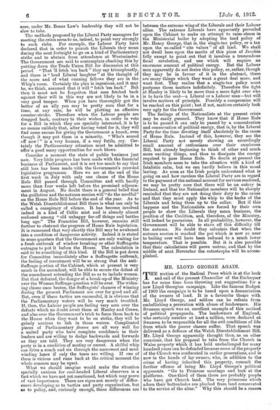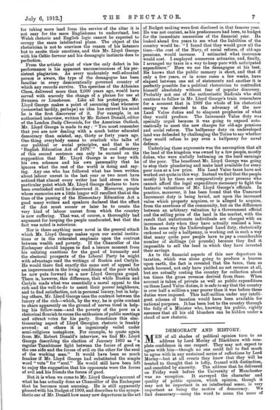MR. LLOYD GEORGE AGAIN. T HE section of the Radical Press
which is at the beck and call of the present Chancellor of the Exchequer has for some time been throwing out suggestions for a new Lloyd Georgian campaign. Like the famous Budget of 1909 the campaign is to be based upon a denunciation of the owners of land. It is a favourite theme with Mr. Lloyd George, and seldom can he refrain from embellishing a peroration with abuse of landowners. His Swansea speech was an excellent example of this method of political propaganda. The landowners of England, who certainly number at least a million, were declared at Swansea to be responsible for all the evil conditions of life from which the poorer classes suffer. That speech was delivered as a defence of the Welsh Disestablishment Bill. Mr. Lloyd George apparently thought then, as on other occasions, that his proposal to take from the Church in Wales property which it has held unchallenged for many hundred years can be defended because some of the property of the Church was confiscated in earlier generations, and is now in the hands of lay owners, who, in addition to the crime of having inherited this property, commit the further offence of being Mr. Lloyd George's political opponents. " Go to Primrose meetings and look at the platforms. One-third of them there are probably people who have got Church land. The very primroses which adorn their buttonholes are plucked from land consecrated to the service of the altar." Why this should be a reason for taking more land from the service of the altar it is not easy for the mere Englishman to understand, but Welsh rhetoric and English logic cannot be expected to occupy the same intellectual plane. The object of the rhetorician is not to convince the reason of his listeners but to excite their emotions, and this Mr. Lloyd George with his Celtic fervour and his demagogic instincts does to perfection. From the artistic point of view the only defect in his performance is his apparent unconsciousness of his per- sistent plagiarism. As every moderately well-educated person is aware, the type of the demagogue has been familiar in every democratically governed country of which any records survive. The speeches of the Athenian Cleon, delivered more than 2,000 years ago, would have served with scarcely the change of a phrase for use at Swansea, or Limehouse. Like all his prototypes, Mr. Lloyd George makes a point of assuming that whenever (somewhat tardily, perhaps) an idea has entered his mind he is the first discoverer of it. For example, in an authorized interview-, written by Mr. Robert Donald, editor of the London Daily Chronicle, for the American Outlook, Mr. Lloyd George is made to say : " You must remember that you are now dealing with a much better educated democracy than existed, say, thirty or forty years ago. One thing everybody seems to overlook who talks of our political or social principles, and that is the ' English Education Act of 1870." The cool effrontery of this second sentence can only be excused on the supposition that Mr. Lloyd George is so busy with his own schemes and his own personality that he ignores what the rest of the world is doing and say- ing. Any one who has followed what has been written about labour unrest in the last year or two must have noticed that almost every writer has laid stress on this particular point which Mr. Lloyd George declares to have been overlooked until he discovered it. Moreover, people whose memories are a little longer will recollect that at the time of the passing of the Elementary Education Act a good many writers and speakers declared that the effect of the Act must sooner or later be to create the very kind of labour unrest from which the country is now suffering. That was, of course, a thoroughly bad argument for keeping the people uneducated, but that the fact was noted is notorious.
Nor is there anything more novel in the general attack which Mr. Lloyd George makes upon our social institu- tions or in the reiterated emphasis upon the contrast between wealth and poverty. If the Chancellor of the Exchequer should happen to find a leisure moment from his untiring exertions for the good of humanity and the electoral prospects of the Liberal Party he might with advantage read the writings of Ruskin and Carlyle. He would there find exactly the same sort of appeal for an improvement in. the living conditions of the poor which he now puts forward as a new Lloyd Georgian gospel. There is, however, this difference, that while Ruskin and Carlyle made what was essentially a moral appeal to the rich and the well-to-do to assist their poorer neighbours, and to find satisfaction, not in personal luxury, but in help- ing others, Mr. Lloyd George uses the contrast between the luxury of the rich—which, by the way, he is quite content to share apparently on the ground of nerves tired in help- ing his fellow-men—and the poverty of the poor as a rhetorical flourish to rouse the enthusiam of public meetings and attract votes for his party. Sometimes this elec- tioneering aspect of Lloyd Georgian rhetoric is frankly avowed : at others it is ingeniously veiled under semi-religious metaphors. For example, to quote again from Mr. Robert Donald's interview, we find Mr. Lloyd George describing the election of January 1910 as " a, regular Tannhauser fight between the forces of good on the one side and the forces of evil on the other for the soul of the working man." It would have been so much franker if Mr. Lloyd George had substituted the simple word " vote " for " soul." He would still have been left to enjoy the suggestion that his opponents were the forces of evil and his friends the forces of good.
But it is when we come to Mr. Lloyd George's account of what he has actually done as Chancellor of the Exchequer that he becomes most amusing. He is still apparently pleased with his Budget of 1909, and describes to the sympa- thetic ear of Mr. Donald how many new departures in the art of Budget making were first disclosed in that famous year. He was not content, as his predecessors had been, to budget for the immediate necessities of the financial year. He looked ahead five years to see what the liabilities of the country would be : " I found that they would grow all the time—the cost of the Navy, of social reform, of old-age pensions, would increase. I estimated what insurance would cost. I employed numerous actuaries, and, finally, I arranged my taxes in a way to keep pace with anticipated expenditure." Here we see the demagogue at his best. He knows that the public memory is short, and that if only a few years, or in some cases a few weeks, have elapsed between one set of statements and another it is perfectly possible for a political rhetorician to contradict himself absolutely without fear of popular discovery. Probably not one of the enthusiastic Radicals who still continue to follow in Mr. Lloyd George's train remembers for a moment that in 1909 the whole of his rhetorical energy was devoted to the advocacy of the new Land Value duties and to eloquent prophecies of what they would produce. The Increment Value duty was specially urged because it was going to expand auto- matically to meet the new charges for old-age pensions and social reform. The halfpenny duty on undeveloped land was defended by challenging the Tories to say whether they would refuse to pay even a halfpenny for naval defence.
Underlying these arguments was the assumption that all the land of the kingdom was owned by a few people, mostly dukes, who were sinfully battening on the hard earnings of the poor. The beneficent Mr. Lloyd George was going to stop their plundering and make land available for every poor man at a low price. His Land Value taxes have not worked out quite in this way. Instead we find that the people mostly hit by them are comparatively poor persons who cannot afford the legal expenditure necessary to fight the fantastic valuations of Mr. Lloyd George's officials. In practice, moreover, it has been found that the Unearned Increment duty is being levied, not upon the increased value which property acquires, or is alleged to acquire, from the exertions of the community, but on the difference between an arbitrary valuation by a Government official and the selling price of the land in the market, with the result that unfortunate individuals are charged with an increment duty when they have actually realized a loss. In the same way the Undeveloped Land duty, rhetorically reckoned as only a halfpenny, is working out in such a way that many quite poor people have to pay a considerable number of shillings (or pounds) because they find it impossible to sell the land in which they have invested their savings.
As to the financial aspects of this new departure in taxation, which was alone going to produce a heaven upon earth, the fact is revealed that the taxes, then so much boomed, not only have yielded no net revenue at all, but are actually costing the country for collection about ten times the gross revenue derived from them. When account is taken of private as well as public expenditure on these Land Value duties, it is safe to say that the country is over half a million a year poorer than it was before these duties were imposed. This half-million under any intelli- gent scheme of taxation would have been available for national purposes. It has been lost to the country through the folly of a Minister who, knowing his public, rightly assumes that all his old blunders can be hidden under a cloud of new rhetoric.



















































 Previous page
Previous page